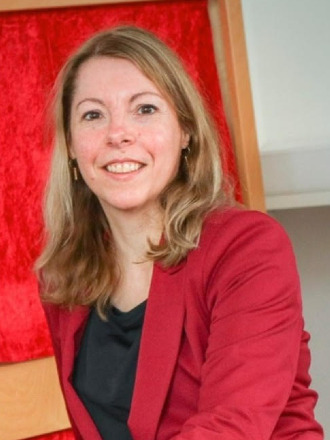Saskia Damen: “Ook met doofblindheid kun je je ontwikkelen”

Hoe kunnen mensen die door een combinatie van beperkingen moeilijk met anderen kunnen communiceren zich toch ontwikkelen en dingen leren? Dat onderzoekt bijzonder hoogleraar Saskia Damen. Ze kijkt daarbij vooral naar het potentieel: wat kan er wél? Op 3 november is haar oratie in het Academiegebouw in Groningen.
Saskia Damen herinnert het zich nog goed: haar eerste ontmoeting met een persoon met doofblindheid. Het was 1999 en als net afgestudeerd orthopedagoog werkte ze op een afdeling met mensen met visuele en verstandelijke beperkingen. Op een dag treft ze daar een doofblinde vrouw aan die op haar knieën in de deuropening naar de keuken zit. Waarschijnlijk in de hoop contact met anderen te maken. Damen: “De keuken was de plek waar begeleiders het meest in en uitliepen. Maar die hadden het druk en er was dus geen tijd voor deze vrouw. Toen ik naast haar ging staan, voelde ze dat meteen. Ze pakte mijn hand en stond op. Doordat ze mijn hand maar bleef vasthouden, werd ik echt geconfronteerd met haar isolement.”

Communicatieve beperking
De gebeurtenis maakt diepe indruk op Damen. Daarom besluit ze zich verder in het onderwerp doofblindheid te verdiepen. Ze komt terecht bij emeritus hoogleraar Marleen Janssen, die als eerste een internationale master over dit thema ontwikkelde. Inmiddels, 17 jaar later, is Damen zelf (bijzonder) hoogleraar en heeft ze haar focus verbreed. Ze richt zich niet langer alleen op personen met doofblindheid, maar ook op personen met een communicatief meervoudige beperking (CMB). Damen: “Bij CMB zijn er twee of meer stoornissen, die samen voor ernstige belemmeringen in de communicatie zorgen. Bijvoorbeeld een verstandelijke beperking en een gehoorbeperking. De wisselwerking tussen deze stoornissen leidt tot zeer specifieke ondersteuningsbehoeften in de communicatie en taalverwerving. Ik merkte dat er bij deze groep, net als bij doofblindheid, een grote behoefte aan hulpmiddelen was.”
Leren en ontwikkelen
In haar onderzoek kijkt Damen vooral naar wat er wél kan. “Door de communicatiebelemmeringen van mensen met doofblindheid of CMB kan het voor de buitenwereld lijken of ze heel weinig begrijpen. Maar net als wij kunnen zij een leven lang leren en zich ontwikkelen. Als orthopedagoog vind ik het een geweldige uitdaging om door middel van onderzoek effectieve manieren te vinden om dit te bevorderen en om hun omgeving hierbij te ondersteunen.”
Ouders
In het onderzoek van Damen is er speciale aandacht voor de ouders van mensen met doofblindheid en CMB. “Zij zijn de continue factor in het leven van deze mensen. Tegelijkertijd lukt het hen niet altijd om op hetzelfde niveau als bijvoorbeeld leerkrachten en begeleiders met hun kinderen te communiceren. Ze hebben hiervoor specifieke kennis en vaardigheden nodig. En daar hoop ik hen met mijn onderzoek bij te helpen.”
Samenwerking
Op 3 november is Damens oratie in het Academiegebouw in Groningen. Haar vijfjarige leerstoel wordt mogelijk gemaakt door Kentalis, een landelijke organisatie die ondersteuning biedt aan mensen die slechthorendheid, doofheid, doofblindheid, een taalontwikkelingsstoornis of een communicatief meervoudige beperking hebben. Damen werkt hier, naast haar aanstelling aan de Rijksuniversiteit Groningen, als senior onderzoeker.
Meer informatie:
- Meer informatie en aanmelden oratie
- Profielpagina Saskia Damen
- Website Kentalis
- Artikel ‘Doofblinden hebben plezier dankzij zintuigenverhalen’
Meer nieuws
-
17 februari 2026
Van ghostbuster tot rampenonderzoeker
-
03 februari 2026
‘Daar zit een goeie kop op’
-
20 januari 2026
Alcohol, appen en e-bikes


